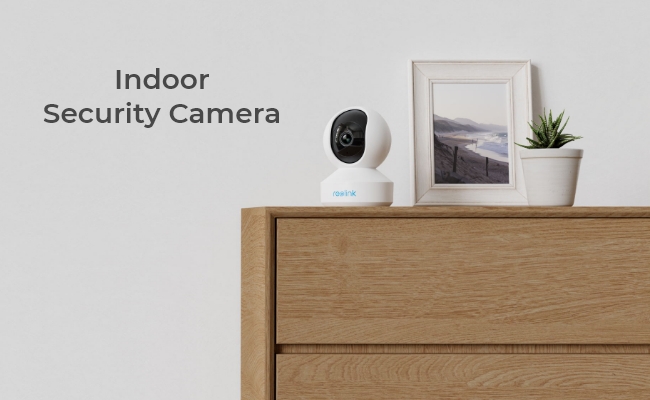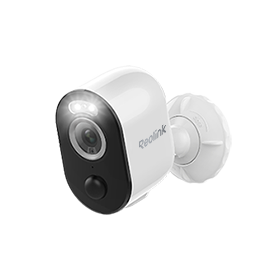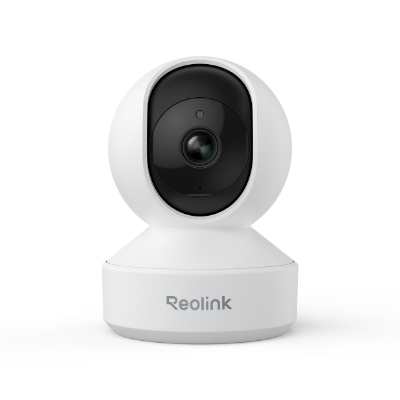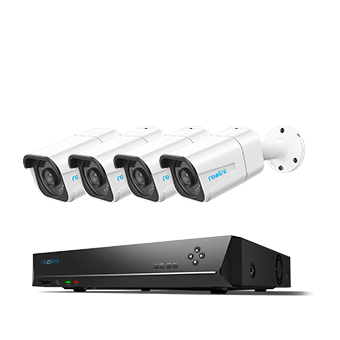2025 Best Indoor Security Cameras to Buy, with Videos and Guides

Indoor security cameras have emerged as the modern guardian to ensure your loved ones and belongings are protected day and night. These cameras offer a watchful eye that never tires. This article will explore the basics of indoor security cameras and uncover their role in safeguarding what matters most to you.
Whether you're a tech enthusiast or just seeking that extra layer of reassurance, this article will help you find the seamless blend of technology and tranquility that indoor security cameras bring and help you choose the best one.
Basics of Indoor Security Camera
Indoor security cameras are designed to monitor the interior of a building, such as a home or office, and serve as a vigilant electronic eye for capturing video footage and sometimes audio within indoor spaces. Indoor cameras are often compact and can be strategically positioned to observe various areas inside a place.
With advanced features like motion detection, real-time alerts, and remote access, indoor security cameras offer a superior sense of security and control over the surroundings and help to deter potential intruders, keep an eye on activities, and provide valuable evidence in case of security incidents.
Wired vs. Wireless Indoor Camera: Which One is Better?
There are mainly two types of indoor security cameras in the market: wired and wireless. Each type has unique characteristics that cater to different preferences and requirements. Knowing their pros and cons will help you determine your best choice.
Wired Indoor Cameras: Pros & Cons
Wired indoor security cameras typically require a direct power source, such as being plugged into an electrical outlet, and they may also use Ethernet cables for data transmission. Wired cameras have the following advantages and downsides compared to wireless indoor cameras.
Pros:
- Reliability and Consistency: Wired indoor security cameras are known for their reliability. They have a consistent power source, and users don't have to worry about battery life or wireless signal strength. This reliability ensures that cameras remain operational without interruption.
- No Interference Concerns: Unlike wireless cameras, wired cameras are not susceptible to interference from other wireless devices. They offer more stable signal transmission and ensure a consistent and precise connection.
- Continuous Power Source: Wired cameras draw power from the electrical grid. As a result, they remain powered 24/7. This means there are no concerns about changing batteries or the camera going offline due to a depleted power source.
Cons:
- Complex Installation: Installing wired cameras can be complex and time-consuming. Routing cables through walls and ceilings may require professional assistance, adding to the overall installation cost.
Wireless Indoor Cameras: Pros & Cons
Wireless indoor cameras operate without the need for running wires and cables. They have built-in WiFi or other wireless communication technologies that enable them to connect to your home or office network. The benefits and downsides of wireless indoor security cameras are as follows.
Pros:
- Installation Convenience: Wireless indoor security cameras are incredibly convenient to install. With no need for extensive wiring, homeowners can set up these cameras independently. The whole installation process can help users to save both money and time.
- Flexibility in Placement: Wireless cameras offer flexibility in terms of placement. They can be easily moved and repositioned. Users can place them in different positions to monitor distinct areas of their homes as their needs change.
- Remote Accessibility: Most wireless cameras have dedicated apps that enable remote access. Users can monitor their homes from anywhere using their smartphone or tablet.
Cons:
- Potential Interference: Wireless cameras may encounter interference from other electronic devices or WiFi networks, affecting signal and video feed quality.
Applications of Indoor Camera
Indoor security cameras have many applications contributing to security monitoring and convenience within indoor spaces. Some typical applications include the following.
Babysitting and Child Safety
Many indoor security cameras can serve as baby monitors. By placing them in their children's rooms, parents can use indoor cameras to keep an eye on their kids when they're in another room or away from home.
Senior Care
Many users choose to use indoor security cameras for elderly care. Indoor security cameras allow caregivers or guardians to remotely monitor the well-being, movement, and daily routines of senior members of their family.
Pet Monitoring
For those who have a pet at home, indoor security cameras let them check on their pets' activity, behavior, and comfort levels from anywhere when they're not around. The installation of indoor cameras can ensure pets are safe and happy.
Business Use
Indoor security cameras can also be applied in all kinds of business settings. For example, landlords use indoor cameras to manage and protect their rental properties. Companies can also use indoor security cameras for employee monitoring, inventory control, and security in their offices and other commercial or working scenarios.
Educational Settings
School security cameras are indeed adequate to enhance intuition security. Indoor cameras can be placed in the classroom or other indoor spaces inside the campus to support real-time monitoring, remote learning, and administrative processes.
Factors to Consider When Choosing Indoor Cameras
The key points or features to consider when you choose the best indoor security camera are price, resolution, audio, night vision, remote viewing, recording or local storage, etc. Here are the details.
Audio
There are two kinds of audio functioning for an indoor security camera:
- 2-way audio
- 1-way audio
2-way audio, also known as two-way communication, means you can listen in and talk back in real time. You can answer the door via your phone connected to the camera even when you're not there and warn the uninvited to leave your property when you're on a trip. 1-way audio, on the other hand, only with a mic, enables you to listen to what's happening. You can choose cameras with two-way communication functionality for enhanced security features.
Subscription
Several security camera manufacturers also provide subscription options for their products. Upon subscribing to a plan, typically billed monthly or yearly, camera owners gain complete control over their devices and can store their recorded footage in the cloud.
However, there are a lot of security cameras without monthly fees that can protect your family and save your budget. They have everything you need, from local storage to smart detection. If you prefer indoor cameras without a subscription, you can choose models with an SD card slot or connect to an NVR.
Recording
If you're not there but need to see what happened inside your home, indoor security cameras with recording options are designed for all that.
There are five options for storing the indoor security camera recording:
- Record motion events to an SD card
- Record all the things to an NVR/DVR
- Record the events on a computer
- Record the events to an FTP server
- Record the events in the cloud
You can choose one indoor security camera recorder according to your needs. For data security, local storage security cameras are highly recommended. Remember to ensure the indoor security camera you've chosen supports at least three options above.
Resolution
Always remember, in most cases, the higher the resolution, the more explicit videos. And 1080p (1920*1080) is the bottom line for the best wireless indoor/outdoor security camera. And that resolution guarantees you will see details clearly with the indoor wireless cam, especially when you put it in a badly-lighted room. You can choose an indoor IP camera in higher resolution, like 2K+ 5MP or 4K 8MP.
See the clarity offered by Reolink 4K security cameras in this video:
Night Vision
Color night vision vs. black and white night vision is another thing you must consider when choosing an indoor security camera. Most indoor security cameras do have the function to switch black/white night vision to color and vice versa. The critical point is, however, if the indoor video surveillance camera comes with a standard image sensor and the LED, it will be hard for you to view colored footage.
If you prefer an indoor security camera with color night vision, choose one with a starlight image sensor and spotlight. And if you want a black/white one (the indoor security camera with black and white night vision), you don't need to stick to "starlight." And this kind of indoor camera is cheaper in most cases.
Budget
To a certain extent, your budget affects the level of indoor home security cameras you would choose from. For example, if you invest in security cameras for only $20, big chances are that you will get a fake or low-grade camera, in many cases, with video loss, signal loss, and blurred images.
But don't get that wrong. Many high-quality and top-branded indoor cameras are affordable (inexpensive) nowadays, costing over $50. If you want a 4K wireless indoor security camera, it will cost you less than $200.
Top Picks for Best Indoor Security Cameras
We've compiled the best top indoor security cameras for your convenience.
Best Wireless Indoor Camera: Reolink Argus 3 Pro
Reolink Argus 3 Pro is one of the best 2K 4MP wireless indoor security cameras. With color night vision capability, this 2K resolution camera lets you get clear and vivid footage day and night. It's a breeze to install and set up due to its dual-band Wi-Fi-enabled, wire-free design. You don't have to worry about its battery life, and you can add a Reolink solar panel to provide non-stop power.
2K 100% Wire-Free Spotlight Camera
2K 4MP Super HD, Battery/Solar Powered, Person/Vehicle Detection, 5/2.4 GHz Dual-Band WiFi, Color Night Vision, Two-Way Audio.
This device has smart detecting technology informed by AI that can detect human movement and vehicles, requiring no extra base stations or hub centers, providing you with an extra layer of protection inside your home. You can use it as a baby monitor or place it inside the senior's room to access the daily routine of your loved ones.
Best Indoor Camera with Continuous Recording: Reolink E1 Pro
Suppose you want a plugged-in version of indoor security cameras. In that case, Reolink E1 Pro is a perfect option as a monitoring camera in the home with its rich features and easy installation. Its sleek design, PT function, and high definition also make it the best video monitoring system for older people or children in the home. You can easily log into the free Reolink App/Client on your smartphone or computer to keep tabs on your loved ones.
Smart 5MP Wi-Fi PT Indoor Security Camera
Crying Detection for Baby Monitoring; Smart Detection & Auto Tracking; 360° Coverage with Pan & Tilt; 5MP Super HD.
With multiple storage options, this camera also supports continuous recording. You can store the footage on an SD card or stream it to the cloud. It is also a simple security camera for users who need to be more tech-savvy because the setup can be completed in just several minutes.
Check out the video below to see the whole setuo process.
Best Indoor Camera System: Reolink RLK8-800B4
An indoor security camera is needed to monitor and safeguard every corner of the indoor space for commercial or educational settings. The reputable security brand Reolink also offers a series of 4K security camera systems with high-quality performance. These systems, such as RLK8-800B4, incorporate Reolink's 4K security cameras and a large-capacity NVR. With one comprehensive 4K security camera system, you can monitor your whole property and save all the footage locally and safely.
4K 8-Channel PoE Security System
4 pcs 4K Ultra HD Security Cameras; 2TB HDD 8-Channel NVR for 24/7 Recording; Person/Vehicle Detection; Plug & Play; 2 Network Solutions.
Indoor vs. Outdoor Camera: What's the Difference?
The division of indoor and outdoor cameras is influenced by the desired installation location chosen by individuals. Here is the comparison table between indoor and outdoor cameras.
FAQs
Can indoor security cameras record audio as well as video?
Yes. Most indoor security cameras can record audio as well as video. Many indoor cameras in the market are equipped with a microphone and speaker, which allows you to listen to the audio of your footage and talk to the person in the video in real-time.
Do indoor cameras work without the Internet?
Most indoor security cameras rely on an internet connection to function effectively. They use WiFi to transmit video feeds and allow remote access to the camera's live stream and recorded footage through a mobile app or web interface. With an internet connection, some features of indoor cameras may be unlimited or available. However, some cameras offer the option to record footage locally to a memory card or storage device, which could function independently of the Internet.
How do I monitor my elderly parents living alone?
To monitor your elderly parents living alone, consider these steps:
- Install indoor security cameras in common areas to remotely check their well-being and activities.
- Set up motion sensors or smart home systems that send alerts when unusual movements or patterns are detected.
- Use wearable devices with health monitoring features to track vital signs and activity levels.
- Establish regular communication routines to stay connected through phone calls, video chats, or messaging apps.
- Enlist the help of neighbors or a professional caregiver who can provide in-person support and assistance when needed.
Are indoor security cameras susceptible to hacking?
Yes, indoor security cameras can be susceptible to hacking if not correctly secured. Poorly configured cameras, outdated firmware, weak passwords, and vulnerabilities in the camera's software can make them potential targets for hackers. Once compromised, hackers can access the camera's live feed, recorded footage, and potentially even your home network.
Conclusion
Indoor security cameras have become an integral part of home security systems for homeowners. These devices offer an ideal solution for users who protect their children and elderly parents. When choosing the right indoor security camera, consider your budget and its functionalities, such as resolution, recording options, color night vision capabilities, and subscription.
What do you think about indoor security cameras? Are they an excellent choice to safeguard your indoor spaces? Leave your opinions in the comment section below and share this article with your friends! Let's discuss it together!
Search
Subscribe for the Latest Updates
Security insights & offers right into your inbox



